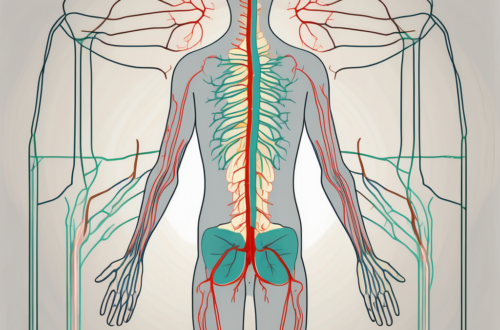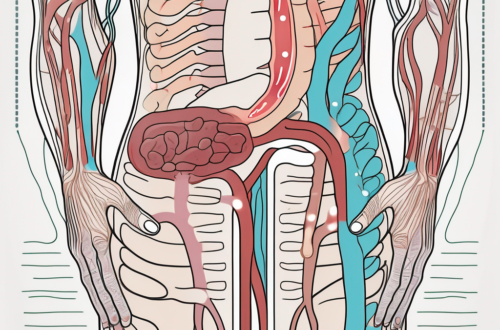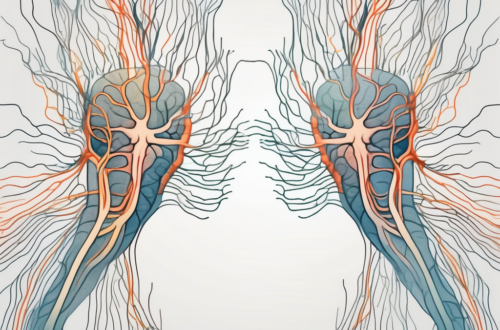The autonomic nervous system is a crucial component of our overall well-being. It plays a vital role in regulating various bodily functions without conscious effort. The autonomic nervous system is subdivided into two main branches: the sympathetic and parasympathetic nervous systems.
Understanding the Autonomic Nervous System
The autonomic nervous system is responsible for controlling the involuntary actions of our body. It manages essential functions such as heart rate, blood pressure, digestion, and respiratory rate. While we may not actively think about these processes, they are essential for our survival and overall health.
Let’s dive deeper into the fascinating world of the autonomic nervous system and explore its intricate workings.
The Role of the Autonomic Nervous System
The autonomic nervous system acts as a bridge between the brain and various organs in our body. It ensures that essential bodily functions are maintained and regulated, making it an indispensable component of our daily lives. Without the autonomic nervous system, these processes would be disrupted, causing significant health problems.
Imagine a symphony orchestra, with the autonomic nervous system as the conductor. Just like a conductor guides the musicians to play in harmony, the autonomic nervous system orchestrates the different organs and systems in our body to work together seamlessly.
For example, when we exercise, our heart rate increases, and our blood vessels dilate to deliver more oxygen-rich blood to our muscles. This response is coordinated by the autonomic nervous system, which activates the sympathetic nerves to prepare our body for physical exertion.
In contrast, during moments of relaxation, such as when we’re enjoying a calm evening at home, the autonomic nervous system shifts gears and activates the parasympathetic nerves. These nerves slow down our heart rate, constrict our blood vessels, and promote digestion and restful sleep.
Key Components of the Autonomic Nervous System
The autonomic nervous system consists of several key components. The first is the ganglia, which are clusters of nerve cells located outside the brain and spinal cord. The ganglia act as relay points, transmitting signals between the central nervous system and various organs. Think of them as bustling train stations where information is exchanged and distributed.
Connected to the ganglia are the sympathetic and parasympathetic nerves, which play distinct roles in the autonomic nervous system. The sympathetic nerves are like the gas pedal in a car, revving up our body’s responses in times of stress or danger. They increase heart rate, dilate blood vessels, and divert blood flow to the muscles, preparing us for fight or flight.
On the other hand, the parasympathetic nerves act as the brake pedal, slowing down our body’s responses and promoting relaxation. They decrease heart rate, constrict blood vessels, and enhance digestion and elimination. These nerves are responsible for the calm and restorative state we experience during moments of peace and tranquility.
Together, the ganglia, sympathetic, and parasympathetic nerves form a complex network that ensures our body functions optimally in various situations. They work in harmony, adapting to our ever-changing internal and external environments.
Next time you take a deep breath or feel your heart rate quicken, remember that the autonomic nervous system is diligently working behind the scenes, keeping your body in balance and allowing you to navigate through life effortlessly.
Diving into the Sympathetic Nervous System
The sympathetic nervous system is responsible for the “fight or flight” response. It prepares the body for action, whether it be escaping from danger or engaging in intense physical activity.
When we encounter a threatening or stressful situation, our sympathetic nervous system springs into action, activating a cascade of physiological responses that enable us to respond effectively. This intricate network of nerves, located along the spinal cord, plays a crucial role in our survival.
Functions of the Sympathetic Nervous System
When faced with a stressful situation, the sympathetic nervous system springs into action. It increases heart rate, dilates blood vessels, and redirects blood flow to the muscles, preparing the body for action. This surge of energy allows us to respond swiftly and decisively, whether it’s running away from a predator or engaging in a high-intensity workout.
Furthermore, the sympathetic nervous system triggers the release of stress hormones, such as adrenaline, into the bloodstream. These hormones enhance our readiness to respond by increasing alertness, sharpening focus, and boosting physical strength. They prepare us to face any challenge head-on.
The Sympathetic Nervous System’s Impact on the Body
While the sympathetic nervous system is essential for our survival and can help us navigate challenging situations, prolonged activation can have negative consequences. Chronic stress, for example, can lead to increased heart rate, elevated blood pressure, and a weakened immune system.
When the sympathetic nervous system remains constantly activated, it can disrupt the delicate balance of our body’s systems. The sustained release of stress hormones can put a strain on our cardiovascular system, potentially leading to cardiovascular diseases such as hypertension and heart disease. Moreover, a weakened immune system can make us more susceptible to infections and illnesses.
It is crucial to find healthy ways to manage stress and give our bodies the opportunity to relax and recover. Engaging in regular exercise, practicing mindfulness and relaxation techniques, and fostering social connections are all effective strategies to keep the sympathetic nervous system in check and maintain overall well-being.
In conclusion, the sympathetic nervous system is a remarkable and intricate part of our body’s response to stress and danger. Its ability to mobilize our resources and prepare us for action is essential for our survival. However, it is equally important to recognize the potential negative impact of chronic activation and take proactive steps to manage stress and maintain a healthy balance in our lives.
Exploring the Parasympathetic Nervous System
The parasympathetic nervous system acts as the counterpart to the sympathetic nervous system. It promotes a state of relaxation and rest, counterbalancing the fight or flight response.
When we think about the parasympathetic nervous system, it’s important to understand its functions and the impact it has on our body. By delving deeper into these aspects, we can gain a better understanding of how this system contributes to our overall well-being.
Functions of the Parasympathetic Nervous System
The parasympathetic nervous system is responsible for calming the body and conserving energy. It decreases heart rate, constricts blood vessels, and redirects blood flow to the digestive organs. This state of rest enables our body to replenish energy and repair itself.
One of the key functions of the parasympathetic nervous system is its role in promoting digestion. When we are in a relaxed state, our body can focus on breaking down food, absorbing nutrients, and eliminating waste effectively. This is why it’s important to create an environment that supports the activation of the parasympathetic nervous system, such as eating in a calm and peaceful setting.
Additionally, the parasympathetic nervous system plays a vital role in maintaining optimal organ function. By reducing heart rate and blood pressure, it allows our organs to work efficiently and effectively. This not only supports our physical health but also contributes to our mental well-being.
The Parasympathetic Nervous System’s Impact on the Body
Engaging the parasympathetic nervous system has significant benefits for our overall well-being. Rest and relaxation allow our body to recover from stress and promote healthy digestion and optimal organ function. Taking the time to unwind and engage in self-care activities can have a profound impact on our physical and mental health.
When we activate the parasympathetic nervous system, we give our body the opportunity to repair and rejuvenate. This can lead to improved immune function, better sleep quality, and enhanced cognitive abilities. By prioritizing activities that promote relaxation, such as meditation, deep breathing exercises, or spending time in nature, we can harness the power of the parasympathetic nervous system to support our overall well-being.
Furthermore, the parasympathetic nervous system is closely linked to our emotional state. When we are in a state of relaxation, it becomes easier to manage stress, anxiety, and other negative emotions. By engaging in activities that activate the parasympathetic nervous system, we can cultivate a sense of calm and inner peace.
In conclusion, understanding and exploring the parasympathetic nervous system allows us to appreciate its role in promoting relaxation, rest, and overall well-being. By incorporating practices that activate this system, we can enhance our physical and mental health, leading to a more balanced and fulfilling life.
The Interplay Between the Sympathetic and Parasympathetic Systems
The sympathetic and parasympathetic nervous systems work in harmony to maintain balance within our body. While they have distinct roles, both are necessary for our overall well-being.
The sympathetic nervous system is responsible for our body’s fight-or-flight response. When we encounter a perceived threat or danger, this system kicks into action, preparing us to either confront the threat or escape from it. It increases our heart rate, dilates our pupils, and diverts blood flow away from non-essential organs towards our muscles, enabling us to respond quickly and effectively.
On the other hand, the parasympathetic nervous system is responsible for our body’s rest-and-digest response. It helps us relax, conserve energy, and restore our body to a state of balance after a stressful event. This system slows down our heart rate, constricts our pupils, and promotes digestion and nutrient absorption.
Balancing Act: Sympathetic vs Parasympathetic
It is crucial to strike a balance between the sympathetic and parasympathetic nervous systems. Too much sympathetic activation can lead to chronic stress and its associated health problems, while excessive parasympathetic activation can hinder our ability to respond to necessary challenges. Finding a middle ground allows us to navigate daily life effectively while still prioritizing our health and well-being.
One way to achieve this balance is through stress management techniques. Engaging in activities such as meditation, deep breathing exercises, and regular physical exercise can help regulate the activity of both systems. These practices promote relaxation, reduce stress levels, and enhance our body’s ability to respond appropriately to different situations.
Additionally, maintaining a healthy lifestyle can contribute to the balance between the sympathetic and parasympathetic systems. Eating a balanced diet, getting enough sleep, and managing our time effectively can all support the proper functioning of these systems. It is important to prioritize self-care and listen to our body’s signals to ensure we are not overloading one system at the expense of the other.
The Effects of Imbalance Between the Two Systems
An imbalance between the sympathetic and parasympathetic nervous systems can have significant consequences. It can lead to issues such as high blood pressure, digestive disorders, sleep disturbances, and weakened immune function. Chronic activation of the sympathetic system can put a strain on our cardiovascular system, increasing the risk of heart disease and other cardiovascular conditions.
Furthermore, an imbalance can also impact our mental health. Excessive sympathetic activation can contribute to anxiety disorders, while inadequate parasympathetic activation can lead to feelings of chronic fatigue and burnout. It is crucial to recognize the signs of imbalance and take appropriate steps to restore equilibrium.
If you notice persistent symptoms or are concerned about the balance within your autonomic nervous system, it is essential to consult with a healthcare professional for proper evaluation and guidance. They can help identify any underlying issues and recommend appropriate interventions to restore balance and optimize your overall well-being.
The Role of the Autonomic Nervous System in Health and Disease
The autonomic nervous system plays a crucial role in maintaining our overall health and well-being. It is responsible for regulating various involuntary bodily functions, such as heart rate, blood pressure, digestion, and immune response. Without the proper functioning of the autonomic nervous system, our bodies would struggle to maintain homeostasis and prevent the onset of various diseases.
How the Autonomic Nervous System Affects Health
A well-functioning autonomic nervous system is essential for promoting optimal organ function and overall health. It ensures efficient digestion by regulating the secretion of digestive enzymes and controlling the movement of food through the gastrointestinal tract. Additionally, the autonomic nervous system helps to maintain balanced hormone levels, which are crucial for the proper functioning of various bodily systems.
Furthermore, the autonomic nervous system plays a vital role in supporting a robust immune system. It regulates the release of immune cells and chemicals that help defend the body against pathogens and foreign invaders. By nurturing and supporting the autonomic nervous system through healthy lifestyle choices, such as regular exercise, stress management, and adequate sleep, we can contribute to our overall health and well-being.
The Autonomic Nervous System’s Role in Disease
Disruptions in the autonomic nervous system can have a significant impact on our health and contribute to the development of various diseases. Imbalances in sympathetic and parasympathetic activity, the two branches of the autonomic nervous system, can lead to a range of health conditions.
For example, an overactive sympathetic nervous system can result in hypertension (high blood pressure), as it causes blood vessels to constrict and the heart to beat faster. Digestive disorders, such as irritable bowel syndrome, can also be influenced by autonomic dysfunction. When the autonomic nervous system fails to regulate the movement of food through the gastrointestinal tract properly, it can lead to symptoms such as abdominal pain, bloating, and irregular bowel movements.
Moreover, disruptions in the autonomic nervous system can contribute to the development of anxiety disorders. The sympathetic nervous system’s overactivity can trigger a “fight or flight” response, leading to feelings of anxiety and panic. Conversely, an underactive parasympathetic nervous system, which is responsible for promoting relaxation and rest, can result in chronic stress and anxiety.
Furthermore, the autonomic nervous system plays a crucial role in immune function. Dysregulation of autonomic activity can lead to immune dysfunction, making individuals more susceptible to infections and impairing the body’s ability to fight off pathogens effectively.
By addressing these autonomic imbalances and supporting proper autonomic functioning, we can work towards restoring optimal health. Techniques such as biofeedback, meditation, and deep breathing exercises can help regulate autonomic activity and promote balance between the sympathetic and parasympathetic branches of the autonomic nervous system.





